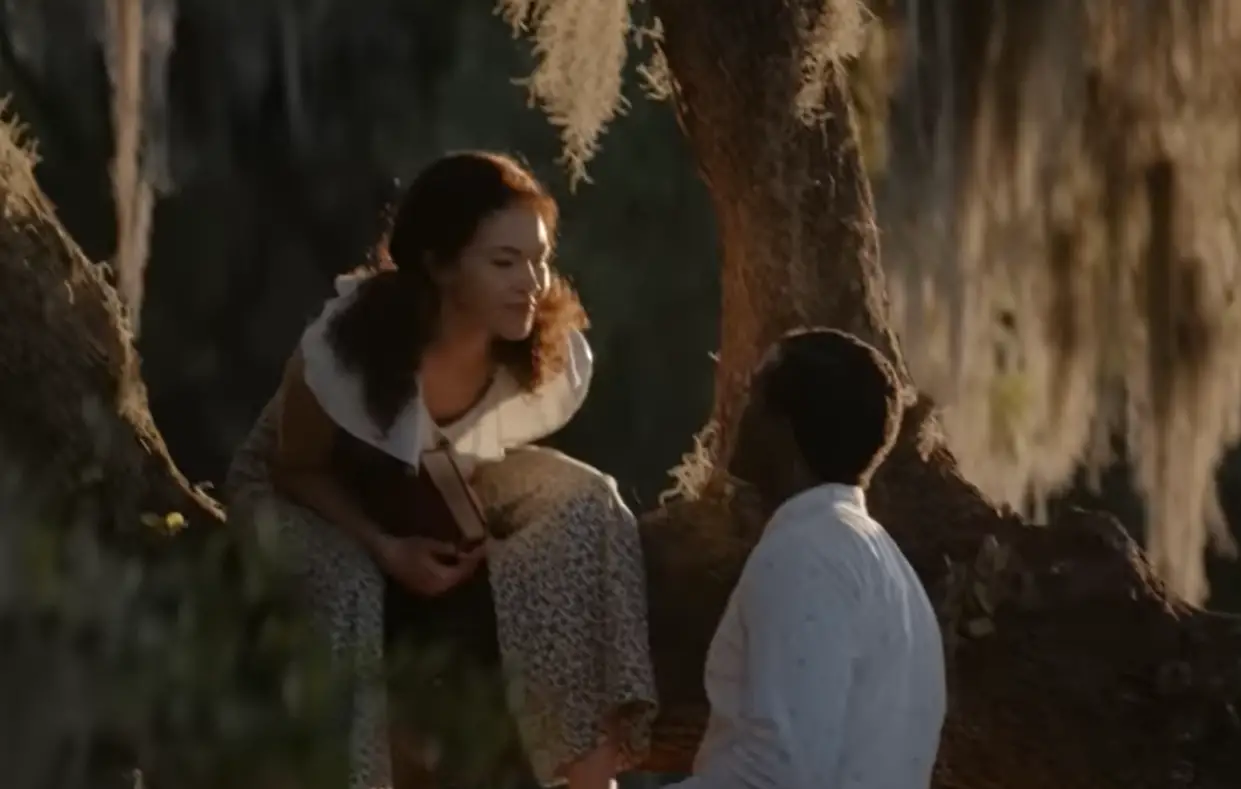Content Warning: Racism, Slavery, Lynching, Death
A film that started as a screenplay written over two decades ago by Tyler Perry, “A Jazzman’s Blues” tells the story of lost love, society and racial identity.
It’s the story of Bayou and Leanne, two star-crossed lovers living in rural Georgia during the Jim Crow era. The opening scenes show Bayou’s mother, Hattie Mae, listening to a politician discuss his family’s civil legacy while also denying being a racist. Hattie Mae turns off the TV and leaves her house for the politician’s office across town. She tells him about her son’s murder, which happened 40 years ago, and implores him to read the stack of love letters she brought in her purse to reveal the proof of the tragedy. As he begins reading the letters, the timeframe transitions to the past, where the viewer sees a young Bayou and Leanne’s story begin.
Bayou’s home life is toxic. His father seems to hate him due to his closeness to his mother and his skin color, while his brother does nothing but demean and degrade him. Leanne’s home life is even more tragic since she is sexually and physically abused by her grandfather. It is through these tragic experiences that the two connect and find love and happiness in each other. However, when Leanne’s mother arrives in town in hopes of having her pass as a white woman to improve their status in society, the two are torn apart.
Although separated by class, race and war, their longing for each other never truly dies. When Leanne returns, passing as a white woman and now married to a member of one of the town’s founding families, she runs into Bayou at his mother’s juke joint. They rekindle their love and begin an affair. Bayou flees to Chicago to avoid lynching and begins his jazz career with his brother Willie Earl and their manager, Ira. As Willie Earl’s drug addiction worsens, Bayou takes center stage and outshines him instantly. Bayou’s career soars, and he becomes so popular that he begins performing for white audiences.
He returns home to visit his mother and soon learns that Leanne had his child. They form a plan to bring Leanne and the baby back to Chicago, where they can be a happy family. However, this plan is foiled when the group that previously attempted to lynch Bayou catches up with him. Leanne and the baby watch in horror as Bayou is lynched. The movie returns to the present, and it is revealed that the politician is actually Leanne and Bayou’s love child. Like his mother, he is a fair-skinned Black man, despite having lived his entire life believing he was white.
While “A Jazzman’s Blues” depicts a beautiful love story that transcends race, class and time, the racial and social issues tackled in the film are difficult to witness. Bayou’s lynching is one of the most harrowing scenes to watch, however for Perry to shy away from this tragic act of violence would be an injustice to the other victims of lynching during this period and after. While the issues of lynching, colorism and the heroin epidemic in African American communities could each inspire films of their own, “A Jazzman’s Blues” focuses specifically on how Leanne’s passing affects her relationship with Bayou.
The act of passing has a long history in America. The podcast “A History of Racial Passing” by Sarah Handley-Cousins, Ph.D. and Averill Earls, Ph.D. discusses the history of passing in response to reverse racial-passing scandals in higher academia. Handley suggests that passing spawned out of the binary social construct of race in America. With the introduction of the “one drop” rule, which dictated that even one drop of Black blood made you Black, blackness became synonymous with bondage and uncleanliness. Conversely, whiteness became associated with freedom or purity.
Passing as white not only meant having a white complexion but, as depicted in “A Jazzman’s Blues,” assimilating to the white culture. Adopting the mannerisms and etiquette of white society was necessary to avoid getting caught — because getting caught could be deadly. In the 19th Century, many slaves attempted to pass as white to escape slavery. According to Handley, three of the children Thomas Jefferson had with his mistress and slave, Sally Hemings, chose to live their lives passing as white. For many African Americans, choosing to live as white meant denouncing their blackness. It also meant they had to disconnect from their Black friends and family to keep their secret. In many cases, husbands and wives would abandon their significant others and children to hang on to their passing lifestyles.
Furthermore, as the eugenics movement made headway in the early 20th century, Black families began passing as white as a means of survival. With the requirement to declare one’s race on official documents, many white Americans began to fixate on the racial identities of their neighbors and friends. In Leanne’s case, she is forced to adopt a white lifestyle and abandon her Black identity in Georgia. She leaves her old life behind and adopts a new one. However, her proximity to her old life drives her crazy, and as a result, she eventually falls back into the life and love she left behind.
While passing as white in the physical sense is no longer necessary in today’s society, racial discrimination due to one’s name or racial identification is still commonplace. Redlining and racial profiling continue to impact the safety and quality of life of Black people everywhere. Sadly, it takes films such as Perry’s to shine a light on America’s dark racial history. It’s a history that many would rather forget, but it should be told and discussed to pave the way for racial and social unity in this country. By embracing films like “A Jazzman’s Blues,” audiences can learn about the past and have the difficult conversations that our parents and grandparents could not.

















